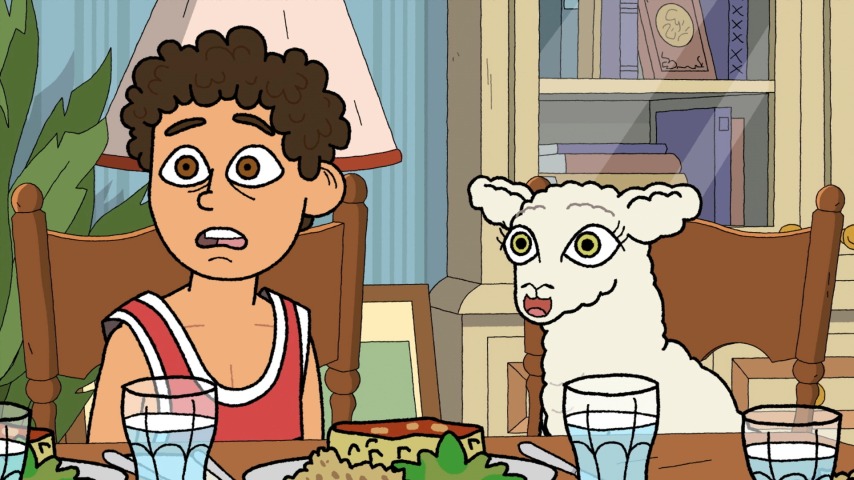Satirical animated sitcom #1 Happy Family USA could use more bite
Prime Video's series is low on laughs but has its heart in the right place.
Image: Prime Video
Ramy Youssef has successfully navigated pivotal themes in Hulu’s Ramy (as its creator-star) and Netflix’s Mo (as its co-writer and -creator), two comedies that share narrative threads despite their distinct settings and tones. Adult protagonists in both shows deal with problems regarding immigration, assimilation, and bigotry, with each tale unfolding with unexpected flashes of humor and drama. Another common aspect is the portrayal of Islam, specifically how the characters embrace culture and religion in the face of bias and hate. Youssef now delves into these beats through the lens of an outlandish animation series, #1 Happy Family USA, which he cooked up with South Park‘s Pam Brady. The result isn’t nearly as astute as Ramy or Mo, but Prime Video’s series can be a delight—at least when the Egyptian American family at its core stays in the spotlight.
The sitcom centers on the Husseins, who’ve settled into suburban New Jersey: Buoyant patriarch Hussein (voiced by Youssef) runs a halal food truck, his no-nonsense wife Sharia (Salma Hindy) works at a dental clinic, and their wry teen daughter Mona (Alia Shawkat) has political ambitions. And then there’s the focal point of #1 Happy Family USA, Hussein and Sharia’s sweet and shy 12-year-old son, Rumi (also Youssef, who expertly juggles both roles). Rumi is going through classic puberty issues. All he wants is to make the basketball team, grow pubes, chill with his buddies, and confess his feelings to a crush. Everything is as normal as it could be when the series begins on September 10, 2001.
Starting #1 Happy Family USA a day before 9/11 immediately establishes a sense of overwhelming dread, which is contrasted by the show’s use of popping animation. A level of anxiety is felt most in the premiere when Hussein welcomes his brother, who just moved to town from Egypt, and makes him a co-partner of the food truck (parked in Midtown Manhattan outside the Fox News building for additional irony), or when Mona promises her longtime girlfriend that she’s finally ready to come out to her parents the next day. There’s also Rumi’s pre-adolescent malarkey, including his desperate attempts to woo a teacher (played by Mandy Moore) he’s “in love with.” Things decidedly take a turn for the worse when a family member dies on September 10, and the Husseins find themselves at an airport the next morning. A bit of miscommunication leads to an awful arrest once the news of 9/11 breaks. However, the extreme seriousness of the situation is undercut by far too much silliness. And therein lies the trouble with #1 Happy Family USA.
The show is unable to sustain the heartfelt, precise depictions of this family because most of the story is painted in broad strokes. After setting the stage for the difficult conversations and tribulations that the Hussein family is bound to suffer, the remaining seven installments don’t dwell on their pressing dilemmas in detail. Instead, the show gets pulled into myriad random directions—Sharia’s kooky boss (portrayed by Kieran Culkin) entangles himself in the Husseins’ lives, there are a few musical numbers, and Rumi’s efforts to win over his teacher are borderline disturbing—that distract from the series’ selling point.








































